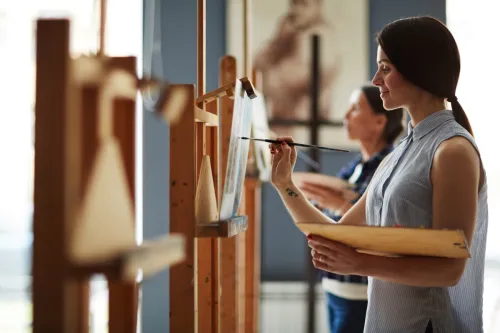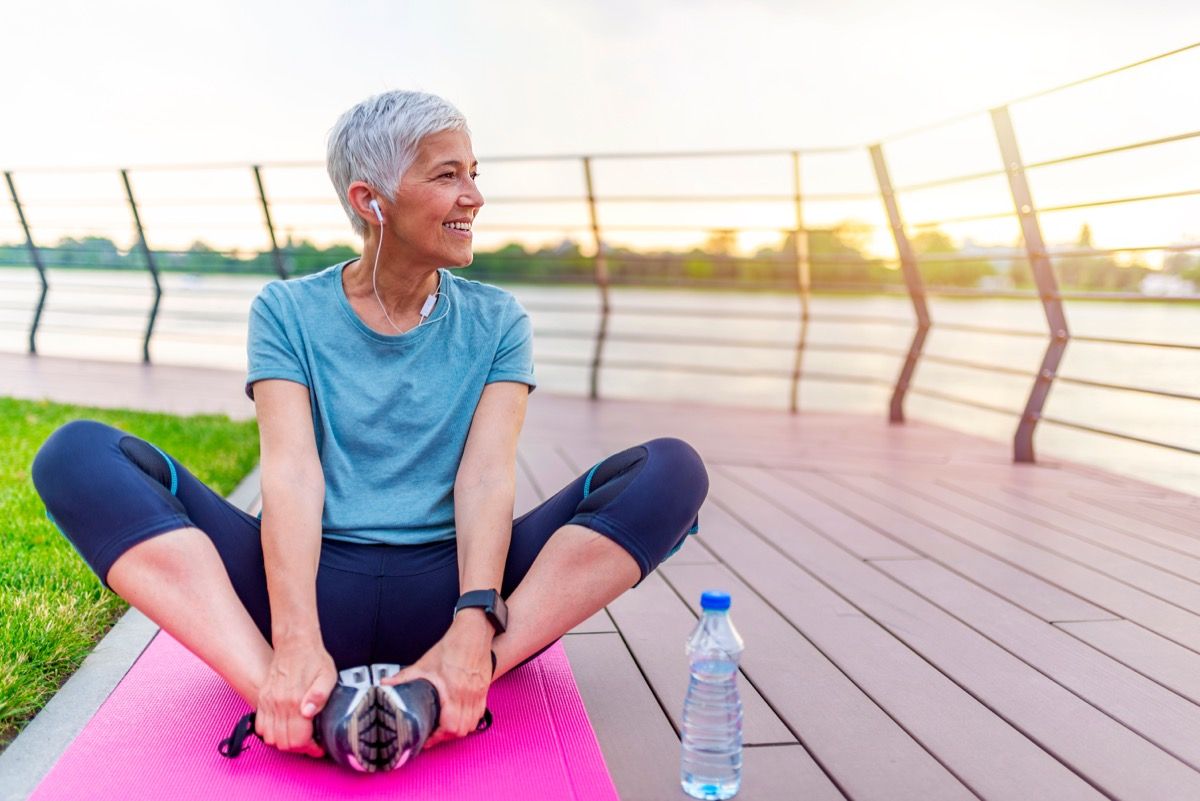20 Hobbies for Women That Will Enrich Your Life

Looking for some pastimes that don’t involve tons of money or even more screen time? Well, you’re in luck, because we’ve put together a list of exciting and enriching hobbies for women. Whether you want to take a stab at standup comedy or get more active in your everyday life, there’s definitely a suggestion here for everyone. Not only that, but activities like these have been shown to improve mood, reduce stress, and even speed up cognitive processing. The best part? They’re also fun! Seriously, these aren’t your grandma’s knitting projects—they’re your ticket to living your best life, a few hours off at a time!
RELATED: 37 Things to Do When Bored So You Don’t Lose Your Mind.
Why Is It Important for Women to Have Hobbies?
History hasn’t exactly reserved a lot of leisure time for women, and even now, we struggle with finding moments for ourselves. According to the Pew Research Center, there is a “leisure gap” between mothers and fathers in America, and it’s more significant than you may think.
On average, men enjoy almost three more hours of doing their own thing each week than women. The reason? Wives tend to devote more time to multitasking than their husbands do. When they are able to take a little time off, it’s often interrupted by the kids.
Now, that’s frustrating to hear for a few reasons. Apart from the obvious fact that women deserve to enjoy themselves every bit as much as men, engaging in hobbies provides a necessary counterbalance to the demands of daily life, offering women a chance to cultivate their interests, foster a sense of identity outside their familial roles, and support their mental health.
How Hobbies Help Improve Mental Health
As mentioned, hobbies are pivotal in supporting our mental health, with numerous studies underscoring their positive impact. Here are just a few examples of how hobbies can improve our happiness and well-being:
- Stress Reduction: A 2015 study published in the Annals of Behavioral Medicine found that participants who engaged in leisure activities experienced lower stress levels and happier moods. Activities such as gardening and knitting involved calming, repetitive motions that can soothe anxiety.
- Improved Mood: Research in the American Journal of Public Health highlighted the benefits of creative hobbies such as painting and music on mood and depression. Creative expression has been shown to release dopamine, a feel-good neurotransmitter.
- Cognitive Enhancement: Puzzles and games that challenge the brain, such as chess or crossword puzzles, have been associated with a lower risk of cognitive decline in older adults, according to a 2022 study in the New England Journal of Medicine.
- Emotional Regulation: Journaling, as a reflective hobby, can help in managing emotions and reducing distress, as noted in a 2018 study from the Journal of Advances in Psychiatric Treatment. It provides an outlet for expressing thoughts and feelings, promoting mental clarity.
- Social Support: Group hobbies can foster a sense of community and belonging, which is crucial for mental health. A 2022 study published in PloS One suggests that social connections can protect against depression and anxiety.
RELATED: 15 Creative Things to Do on Your Birthday That Are Totally Affordable.
Creative Hobbies for Women

1. Artistic Painting and Drawing
The arts provide a direct route to creativity, offering a variety of mediums and techniques to explore. Beginners can look to a wealth of instructional resources, including lessons and tutorials, for help getting started. Exploring the world of drawing and painting can be a deeply fulfilling experience. And there’s a wide spectrum of art forms to delve into, including:
- Sketching
- Watercolor Painting
- Acrylic Painting
- Oil Painting
- Digital Art
- Charcoal Drawing
- Pastel Art
- Ink Illustration
- Collage Making
- Mixed Media Art
2. Crafting and DIY Projects
Crafting and DIY projects are a practical way to express creativity. Activities range from jewelry making and sewing, which allow for personal expression through wearable art, to home renovation and interior design, where functional changes can also reflect individual style.
Or, maybe you’d prefer knitting your own clothes and practicing calligraphy—two hobbies known to help reduce stress and improve focus. Remember: The world of crafting and DIY is diverse, offering numerous opportunities to create unique items and enhance living spaces.
3. Writing and Journaling
Writing and journaling are practical tools for processing thoughts and emotions. Creative writing can also boost self-esteem and provide a means for expression. In some cases, these activities can even lead to income through activities such as blogging.
The hobby encompasses a variety of genres, each offering a different way to engage with writing. Whether through workshops, online classes, or personal practice, writing is a creative hobby that supports mental health and provides a sense of connection with oneself and others. A few different forms of writing for women (or anyone!) to try out include:
- Poetry
- Prose
- Fiction
- Essays
- Spoken Word Poetry
RELATED: The 20 Best Games to Play With Your Most Competitive Friends.
Physical Activities for Health and Fitness

4. Yoga and Pilates
Yoga and Pilates are often recognized for the physical and mental health benefits they provide. A study published in the Journal of Alternative and Complementary Medicine found that yoga interventions effectively reduce stress. By combining physical postures, controlled breathing, and meditation, yoga helps improve flexibility, build strength, and promote relaxation.
5. Walking, Hiking, and Jogging
Hiking is one of the more convenient hobbies out there. Depending on how you’re feeling on any given day, you can choose your own adventure, from a leisurely walk in the park to a full-on mountain expedition. Keeping up with this kind of exercise is also a great way to maintain your heart health. And enjoying some fresh air can be a mental refresh.
It doesn’t have to be a solo hobby, either. Joining a hiking group or club can be the start of some great friendships and shared adventures. You also don’t need much to get started. The only equipment required are a pair of good shoes and some athletic wear.
6. Cycling and Biking
Biking is a practical and environmentally friendly hobby that offers a mix of adventure, fitness, and exploration. It can improve your cardiovascular health and lower body strength, plus reduce stress and improve your mood. The rhythmic motion of pedaling can also serve as a form of moving meditation, providing mental relief.
It’s also a low-impact exercise, making it easier on the joints than running. For those concerned with sustainability, biking is a green alternative to driving, helping to reduce carbon emissions and traffic congestion. Joining a cycling group or participating in cycling events has social benefits as well, such as making new friends and building a sense of community. And with more bike lanes and trails being developed in cities and towns across the country, biking is becoming an increasingly accessible hobby.
7. Kayaking and Paddling
Kayaking is a great hobby for anyone looking to spend a little more time in nature. It’s also associated with a host of physical health benefits, including for your upper body and core. You don’t need much gear to start—just a kayak, a paddle, and a life jacket. It’s pretty easy if you’re paddling on calm waters, but you can up the challenge by taking on rougher currents.
It’s also a smart activity choice for joint health since it’s a low-impact exercise. And focusing on your paddling can help clear your mind. Plus, being outside means you’re getting your dose of vitamin D, which is good for your mood.
You can kayak alone for some quiet time or with a group for a social outing. There are plenty of clubs and tours you can join. If you’re new to the hobby, you can take lessons to learn the basics and stay safe.
8. Dance and Movement
Dance and movement lend themselves to both exercise and creative expression. In dance classes, participants can engage in various styles, each offering unique benefits for physical coordination and mental well-being. It’s a space where stress reduction and skill development go hand in hand. Some popular dance styles include:
- Ballroom
- Hip-hop
- Ballet
- Jazz
- Contemporary
- Salsa
- Tap
RELATED: 20 Genius Ways to Kill Time Without a Smartphone.
Intellectual and Learning Hobbies for Women

9. Reading and Book Clubs
Reading and book clubs offer a space for intellectual engagement and social interaction. In these groups, members dive into a variety of genres and authors, which can sharpen critical thinking and foster personal growth. The shared experience of reading and discussing books can also build a sense of community.
Engaging with different perspectives through reading can expand one’s empathy and understanding. Book clubs encourage regular reading habits by setting schedules for reading and discussion, which can be particularly motivating. They often explore themes and characters that resonate with women, providing a forum for discussion and mutual support.
10. Language Learning
Language learning opens doors to new cultural insights and enhances communication skills. With today’s technology, picking up a new language is more accessible than ever. Some of the benefits include:
- Preparing yourself for travel
- Enriching personal and professional interactions
- Improving your cognitive abilities
- Enhancing your emotional intelligence
The practicality of language learning is what makes it so appealing. With tons of different apps at your fingertips, some free or at a minimal cost, you can progress at a comfortable pace. It’s an ideal activity for people who:
- Love to engage in creative writing
- Wish to enhance their problem-solving skills
- Want to improve their memory function through the mental exercise that language learning provides
11. Online Courses and Workshops
In today’s digital age, online courses and workshops offer a practical avenue for personal and professional growth. They’re available for learning a variety of skills, from digital illustration to coding, all from the comfort of your own home. Culinary enthusiasts can refine their cooking techniques through specialized websites, while those with a penchant for music can find inspiration in relevant online resources.
Participating in online education can strengthen focus and self-confidence, and it’s an empowering step towards acquiring new competencies. Whether you’re interested in a photography workshop, dance tutorial, or an academic course, these tools are tailored to accommodate diverse learning preferences and schedules.
RELATED: 7 Retirement Activities That Will Keep You Busy and Engaged.
Culinary and Food-Related Hobbies

12. Cooking and Baking
Cooking and baking are great outlets for creativity. The process also provides a hands-on experience that engages the senses and can lead to a sense of accomplishment. A study by the Journal of Positive Psychology found that participants who took part in creative activities, including cooking, reported feeling more relaxed and happier.
Remember, these culinary activities aren’t just about sustenance—they’re a form of self-expression and learning. They offer the opportunity to develop new skills, understand the science behind the recipes, and appreciate the cultural tradition behind dishes. Whether it’s preparing a meal while listening to a podcast or hosting a dinner party, cooking and baking can be enriching hobbies that feed both body and mind.
13. Food Photography
Food photography is a specialized field that focuses on presenting food in the most appealing way possible. It’s not just about taking a picture of a meal; it’s about crafting an image that showcases the dish’s colors, textures, and details in the best light. A well-composed food photograph can tell a story about its origins, the culture it represents, or the dining experience.
Building a strong portfolio is crucial for any food photographer, as it demonstrates their skill and style to potential clients and followers on platforms like Instagram and Pinterest. Networking with other photographers on social media can provide constructive critique, fresh ideas, and insights into the latest industry trends.
This rewarding hobby is ideal for those interested in gastronomy and visual arts. It requires a keen eye for detail and an understanding of manipulating elements like composition and lighting to produce a compelling image.
14. Wine and Craft Beer Tasting
Wine and craft beer tasting are fun hobbies that explore the beverage world’s diverse flavors and aromas. These activities allow enthusiasts to understand the nuances that distinguish different drinks. Highlighting the role of women in this industry underscores the innovation and entrepreneurship that’s increasingly present in the craft beer scene.
Also, these hobbies involve more than just enjoying a drink; they’re about appreciating craftsmanship, learning about the history of winemaking and brewing, and understanding the processes that create each type of beverage. They can also pave the way for personal ventures like home brewing or joining societies dedicated to tasting, where participants can exchange knowledge.
Whether hosting a tasting event or visiting local breweries, these hobbies offer a blend of social engagement, education, and a touch of indulgence.
RELATED: 50 Fun Things to Do At Home Right Now.
Social and Community-Based Hobbies for Women

15. Volunteering and Mentorship
Volunteering and mentorship are practical ways to contribute positively to society, offering real and measurable benefits to everyone involved. These activities provide a platform for sharing knowledge and skills, potentially opening new doors for the next generation. Volunteering, in particular, can also expand your worldview and help forge diverse social networks.
The value of giving your time and expertise is significant. It not only bolsters community strength and aids those in need but also enriches your own life. Participating in these activities can lead to personal growth and satisfaction from making a real difference.
Whether it’s spending time at your local community center, supporting environmental initiatives, or helping to plan community gatherings, volunteering and mentorship are meaningful pursuits. They’re more than hobbies; they’re opportunities for personal development and impactful contribution. Consider how you might engage in these activities to benefit both your community and yourself.
16. Group Sports and Fitness Classes
Group sports and fitness classes are a dynamic combination of physical activity and social engagement. Available at local gyms or community centers, these classes offer structured workouts in a group setting, which can be a motivating factor. The sense of community in these classes often leads to natural encouragement and accountability among participants, helping everyone to stretch their limits and meet their fitness targets. Key advantages of group sports and fitness classes include:
- Increased motivation and accountability
- Variety in workouts and exercises
- Expert guidance and instruction
- Social interaction and support
- Fun and enjoyable atmosphere
17. Local Clubs and Organizations
Local clubs and organizations are hubs for community involvement, where people with common interests can connect. Take gardening clubs, for example: They’re not just about planting and pruning but also about exchanging knowledge and nurturing a shared space, especially for those without gardens of their own. Photography clubs, meanwhile, offer a space to improve your craft and appreciate different perspectives through the lens.
These groups can also be a boon for mental health. Evidence suggests that activities such as gardening can enhance well-being, thanks to the calming effects of green spaces. In addition to helping you advance in whatever hobby you’re pursuing, joining a clubs or two will help you build a network offering support and friendship.
RELATED: 10 Things the Happiest People Do Every Morning.
Mindfulness and Relaxation Hobbies

18. Meditation and Breathing Exercises
Meditation and breathing exercises are practical methods for managing stress and improving mental clarity. These techniques, grounded in scientific research, encourage us to focus on the present moment and the rhythm of our breath, which has been shown to lower stress hormones and enhance our overall mood. They’re accessible to anyone, regardless of experience level, and can be easily incorporated into daily life.
19. Aromatherapy and Essential Oils
Aromatherapy and essential oils tap into the natural potency of plants, offering a scientifically-backed approach to enhancing well-being. These concentrated plant extracts can influence mood, alleviate stress, and improve the atmosphere of our surroundings. For instance, chamomile is known for its calming effects, eucalyptus for its decongestant properties, and lavender for aiding sleep. There are several evidence-based methods to utilize essential oils. Consider the following applications:
- Add them to a bath
- Diffuse them in the air
- Apply them topically to pulse points for a natural and gentle way to promote relaxation and well-being
- Create your own blends, combining oils like clary sage and chamomile, or lavender with rosemary and lemon, to suit your personal needs and preferences
20. Adult Coloring and Puzzles
Adult coloring and puzzles are effective ways to engage your mind and unwind. Tackling puzzles can enhance problem-solving skills and concentration, while adult coloring books provide an outlet for creativity without the pressure of starting from scratch.
Both activities have been linked to mindfulness, helping to anchor you in the present moment—a practice supported by research as beneficial for mental health. They’re not just for passing the time, they’re also tools for mental maintenance. Whether you’re methodically placing puzzle pieces or coloring detailed designs, these hobbies offer a quiet respite from daily stressors.
Frequently Asked Questions
How can I start exploring new hobbies that fit my interests?
Start by reflecting on activities that bring you joy and satisfaction. Then, search for classes or online resources related to those interests and don’t hesitate to try something completely new—you might discover your next passion!
Are hobbies actually beneficial for my mental and physical health?
Yes, hobbies are indeed beneficial for both your mental and physical health. They can reduce stress, boost happiness, and contribute to a sense of achievement, while also improving fitness and cognitive abilities.
Can hobbies help me connect with others?
Absolutely! Hobbies such as book clubs, group sports, and volunteer work are fantastic for meeting new people and forming friendships, as they offer shared experiences that can lead to lasting social connections. So, go ahead and explore activities that interest you!
How do I find time for hobbies with a busy schedule?
Make time for hobbies by scheduling regular sessions in your calendar and treating them as important appointments. Remember, it’s essential to prioritize yourself and find balance in your busy schedule.
What if I start a hobby and realize it’s not for me?
It’s completely OK to realize a hobby isn’t for you. The important thing is to keep exploring and trying different activities until you find something that truly resonates with you and brings joy to your life. Keep on exploring!
- Source: The Influence of Leisure Engagement on Daily Emotional Well-being
- Source: The Connection Between Art, Healing, and Public Health: A Review of Current Literature
- Source: Computerized Games versus Crosswords Training in Mild Cognitive Impairment
- Source: Emotional and physical health benefits of expressive writing
- Source: Social connectedness as a determinant of mental health: A scoping review
- Source: Calligraphy and meditation for stress reduction: an experimental comparison
- Source: Yoga as an alternative and complementary approach for stress management: a systematic review
- Source: Everyday creative activity as a path to flourishing